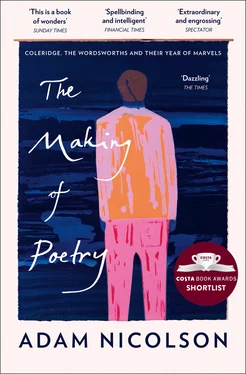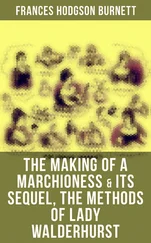1 ...8 9 10 12 13 14 ...19 Over this entire relationship, of such intimacy and such mutual interpenetration – and with such undisputed dominance of male over female – hangs the question of Annette Vallon and her daughter Caroline. Racedown was a mirror-image of the situation Wordsworth had left behind in France. He and his sister were now living together in Dorset as he and the mother of his child were not in Blois. He was looking after and tending to a young child, Basil Montagu, as he was not his own daughter in France.
Guilt stalks these arrangements, and Dorothy’s unqualified admiration of and service for her brother look like the necessary balm for a man besieged by it. Racedown was a parodic rerunning of the married life William had not begun in France. He had saved both Dorothy and Basil from the isolation and difficulty to which they might otherwise have been condemned, but to save them he had left Annette and Caroline to the same fate.
Did Wordsworth abandon one woman and child to attend to another woman and child? And for his own convenience? Or was it that only with Dorothy, and not with Annette, could he see his way to being the poet he knew he wanted to be? Writing in The Prelude of his years of despair at Racedown – and never admitting in that poem or anywhere else to the existence of Annette or her child – he very nearly said that. Dorothy was his saviour because she saw a poet in him and was prepared to fight for that poet. She was
the belovèd woman in whose sight
Those days were passed – now speaking in a voice
Of sudden admonition like a brook
That did but cross a lonely road; and now
Seen, heard and felt, and caught at every turn,
Companion never lost through many a league –
Maintained for me a saving intercourse
With my true self (for, though impaired, and changed
Much, as it seemed, I was no further changed
Than as a clouded, not waning moon);
She, in the midst of all, preserved me still
A Poet, made me seek beneath that name,
My office upon earth.
It is the most beautiful metaphor of love, of a woman as a mountain brook coming and going along the same valley as the road the poet is taking, bringing her irrigating, generous presence to the drought of his journey and his despair. In later revisions he added the beautiful suggestion that in the darkness of the waning moon, ‘ She whispered still that brightness would return ’. The moon would wax again. Love is in that line, love given and heard. There is a suggestion, as often in what he would write about her, of suppressed desire, in the physical intimacy of ‘Seen, heard and felt, and caught at every turn’, in the giving liquidity of her presence, in the brook’s gentle washing of him and perhaps even in the atmosphere around ‘intercourse’, which by the late 1790s had already begun to carry the implications of ‘sexual connection’. There is no suggestion of equality between them. She is the servant, he the walking hero; she quietly attends, he struggles with his greatness. He relies on her and dominates her; he uses her and she conforms to the idea that she is there to be used. One version of her usefulness is the strictness with which she can admonish him. Both master and servant are happy for one to be reproved by the other, and to understand that admonition as a form of love.
Here then, on this summer evening in early June 1797, assembled together in the small parlour of Racedown, with the oil cloth on the floor, and an air of warmth and mutual affection and value in the room – all his life Coleridge would remember the welcome they gave him this evening – the sun dropping outside, these three people, each in their varied, multi-layered conditions of longing and despair, genius and trouble, sit down together to talk, to discuss what they have written and seen, what they might write, what they have been and what they might yet be. It is the seeding moment of this year.
Coleridge came to love and revere them both, as one sensibility in two people. Much later, he wrote to Dorothy about their brother, who had come along with him and Wordsworth on a walking tour through the north of England:
Your Br. John is one of you; a man who hath solitary usings of his own Intellect, deep in feeling, with a subtle Tact, a swift instinct of Truth & Beauty.
One of you: as if ‘Wordsworth’ is not the name of a person but a way of being, not entirely communicative to others, with a prompt tactility but unseen depths, both a flickering quickness and an immanence in all of them, as if their dwelling was some way far below the surface, profoundly attractive and curiously removed.
Sit in the valley of the little River Sydeford below the house, in the shadow of its willows and alders, with the evening hatch of olives speckling the yard of air above the water, the cattle grazing in the last sunlight on the sloping fields, their long-bodied shadows patched across the pasture, and an owl announcing itself in the wood across the valley, and it is not difficult to see the three of them there beyond the darkened panes of the parlour windows.
The owl is muted, like a trumpet with a cushion in its mouth. The robins are still singing in the hollies, one on each side of the river, bright as water. Next to them the owl is throaty-chesty. If a cough could sing, it would sound like this.
There is a sheet on the table, for want of a tablecloth. Coleridge is asleep upstairs. Wordsworth at the table looks across to Dorothy, where she is transcribing from his notebooks. Rough pages lie torn out between them, and she is copying in her neater more regular hand from his tragedy T he Borderers .
He is looking at her, but there is a vacancy in his eye and he is looking across her, through her, his own pen poised over a notebook, as she is busy copying.
What is this word? she asks. Sublimity ?
No, no. Sterility .
They sit there with a kind of contentment between them, no tension, a jointness, ease.
What does this say Will? I am the devil?
No, he half laughs with his outgoing breath. No, ‘I am the dark .’
The dark? She laughs at him.
It runs on to the next line: ‘I am the dark/Embracer of the superlunary world.’
As he speaks, the life-flame in him is barely visible. Only now and then, as some breeze blows over him, her breeze, a movement and change becomes apparent, a reanimation of the suspended life, a breath across coals. Wherever his vacant eye looks, he can see through to the bones and the soft inner parts. But that is because he is also transparent to himself, and in himself finds the boneyard of the past, a littered emptiness, the ashy remains of what he thought he might have been. Behind it, distant, is some other, larger and half-forgotten mountain world, his time in the Alps or in north Wales, his childhood in the Lakes. In certain lights he looks as gaunt as a new-dropped lamb.
3
June 1797
Coleridge stayed at Racedown for the next three weeks, and the talk began. For months Wordsworth’s poetry had been fragmentary, fierce and strange, moving between the worlds of doubt and guilt, finding significance on the borders of madness. He read his poems to Coleridge. A set of sketches and revisions of one of them has survived on the reverse side of the same large folio sheet as his lines on the baker’s cart, with further thoughts and rethoughts of it on a neighbouring sheet, both now in the Wordsworth archive at Dove Cottage.
Looking at these repetitive, hesitant drafts of something Wordsworth would come to call ‘Incipient Madness’ is like observing a man feeling for poetry with his fingertips in the dark.
There were at least twelve uncertain and twitchy stages. From the first moment are three words:
Читать дальше












